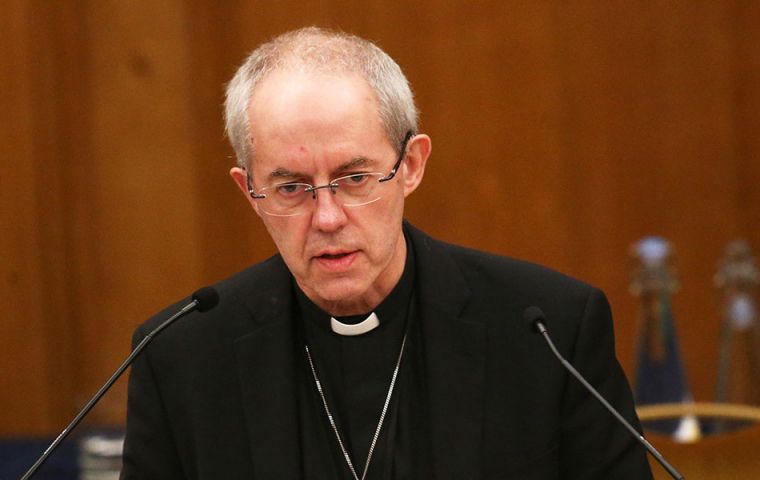MercoPress. South Atlantic News Agency
Archbishop of Canterbury says UK economic model is failing with a growing gap between rich and poor
 Archbishop Justin Welby claims the economic model is broken, and UK needs “to make fundamental choices about the sort of economy we need”
Archbishop Justin Welby claims the economic model is broken, and UK needs “to make fundamental choices about the sort of economy we need” Archbishop of Canterbury, Justin Welby, says Britain's economic model is broken, as the gap between the richest and poorest parts of the UK widens. Britain stands at a watershed and must make “fundamental choices” about the direction of the economy, he said.
The remarks come in a report by a commission set up by the centre-left Institute for Public Policy Research.
The UK Treasury said: “Employment is at a record high, the deficit is down and inequality is at a 30-year low.”
The IPPR's interim Commission on Economic Justice report says the UK economy is the most unbalanced in Europe, and contains more workers overqualified for their jobs than the rest of the European Union.
Britain's economic model is simply unfit for the 2020s, the IPPR argues. The organization proposes a “fundamental reform” of the economy, on a scale comparable with the Atlee reforms of the 1940s and the Thatcher revolution of the 1980s.
Committee members include the Archbishop, along with leading figures from business and civil society.
The archbishop said: “Our economic model is broken. Britain stands at a watershed moment where we need to make fundamental choices about the sort of economy we need.
”We are failing those who will grow up into a world where the gap between the richest and poorest parts of the country is significant and destabilizing.“
The report sets out new analysis which suggests that, although GDP per head has risen by 12% since 2010, average earnings per employee have fallen by 6%.
It says that since the 1970s, the share of national income that has gone to wages has gradually declined, from 80% to 73%, while the share going to profits has increased. The wage share is now the lowest it has been since the World War Two.
The report says that economic growth and earnings have ”'decoupled“ since the financial crisis.
It states: ”The UK economy no longer translates economic growth into rising earnings. Gains from growth have gone largely into profits rather than wages, and the UK economy is now in the longest period of earnings stagnation for 150 years.”
The Commission is calling for an urgent public debate on taxation, the role of the financial sector, the power of trade unions as well as looking at the impact of new company models including Google and Amazon.
As well as the Archbishop of Canterbury, the IPPR commission's members include Sir Charlie Mayfield, the chairman of John Lewis, Juergen Maier, the chief executive of German electronics giant Siemens, and Frances O'Grady, the general secretary of the TUC.




Top Comments
Disclaimer & comment rules-

-

-

Read all commentsIn view of the fact that today, 06/09/2017, statistics have been published in the national press in UK to the effect that Britain is no longer a Christian country it seems to me that it doesn't really matter one or another what the Archbishop of Canterbury says. It used to be said that the CofE was the Conservative Party at prayer - clearly this is no longer the case.
Sep 06th, 2017 - 01:36 pm +1I can find stories going back to 2009 saying the same thing. Certainly it's less relevant than before, but if the CofE was the Conservative party at prayer, does that mean the church was as much influenced by its member's politics as vice-versa? Because the current message doesn't exactly fit with Conservative philosophy...
Sep 06th, 2017 - 11:05 pm 0The question is why is this piece appearing in Mercopenguin, a British government propaganda organ supposedly devoted to America, South America and the “South Atlantic”?
Sep 08th, 2017 - 03:49 am 0Commenting for this story is now closed.
If you have a Facebook account, become a fan and comment on our Facebook Page!